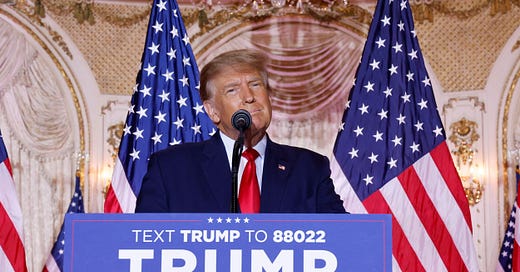The date was November 16, 2022. The midterm election had ended just 8 days before. And Donald Trump announced he was running for president. Again.
“In order to make America great and glorious again, I am tonight announcing my candidacy for president of the United States,” he told a crowd at Mar-a-Lago.
Even then it seemed like a somewhat odd decision. The frontrunner — which Trump was (and is) is usually the last candidate in a race. But he was now the first.
It got even weirder as time went on — and Trump did next to nothing, publicly at least, by way of campaigning.
In a piece headlined “The Trump Campaign that Isn’t,” that ran in mid December, The Hill newspaper wrote:
“Since [the announcement], Trump has not held any formal campaign events. He has not traveled to early voting states, made any major staffing announcements or done much of anything to scare off would-be rivals.
“Instead, he’s been making headlines for controversies including dining with a white nationalist and calling to suspend the rules of the Constitution to redo the 2020 election.”
Later in December, Time wrote an article titled “Six Weeks In, Donald Trump’s Disastrous Campaign Launch is Eroding His Support.” It included these lines:
“He’s rarely left his Mar-a-Lago home since launching the campaign on Nov. 15, and hasn’t hosted any other major campaign events or attended rallies that might have helped keep his momentum going…
…A visit to Trump’s campaign website in late December yielded no information about future events or his political platform. Visitors to the site saw a popup window requesting an email and cell phone number, which then sent them to a video of Trump encouraging supporters to ‘get on line, donate, sign up, take action, volunteer, get organized, talk to your neighbors.’ Visitors were then directed to a fundraising page, and a link to a shop selling campaign swag, including flags, T-shirts, wrapping paper featuring Trump in a Santa hat, and an ornament in the shape of a red baseball cap reading, ‘Trump Save America.’”
So, yeah. Not great.
Fast forward to this coming weekend where Trump appears to — finally — be starting his campaign in earnest, with back-to-back trips to New Hampshire and South Carolina.
All of which raises — at least to me — a pretty simple question: Why the hell did Trump announce his candidacy two months ago if he was only going to start, you know, campaigning now?
I have a few theories.
He wanted to scare away the competition: Trump is, at heart, something of a bully. He likes being intimidating — politically and otherwise. What better way to executive on that agenda than to be the first person in the presidential race — to say, essentially, who wants to come tangle with me? Trump even seemed to elude to the rigors of running a presidential campaign — as a warning to other competitors — in his announcement speech. “Anyone who truly seeks to take on this rigged and corrupt system will be faced with a storm of fire that only a few could understand,” he said.
He was trying to insulate himself from prosecution. Trump has myriad legal problems. Perhaps most seriously he is facing a) a special counsel investigation into his handling of classified documents and b) a Department of Justice investigation into his activities before, during and after the January 6, 2021 riot at the U.S. Capitol. I would not put it past Trump to make this calculation: It’s harder for the feds to indict me when I am actively running for the presidency than if I’m not. If they do it, it will look like they are trying to put their hand on the scale of a coming election, which is a bad look.
He couldn’t resist. There’s a tendency to ascribe deep strategic meaning to every move that Trump makes even when recent history suggests that oftentimes he’s just, well, doing stuff. Trump had been not-so-subtly signaling for months (and months) that he was going to run again in 2024 and maybe he just got sick of playing just a little bit coy. And, in so doing, he got ahead of where his organization and campaign actually was — hence the delay in making appearances and doing the sorts of things that campaigns do.
It’s not clear to me that Trump’s announce-early gambit has had much of an impact. Just this week former Secretary of State Mike Pompeo and former United Nations ambassador Nikki Haley signaled that they are moving closer to running for president. Former veep Mike Pence seems like he is in too. Ditto Florida Gov. Ron DeSantis who, unlike Trump, appears fine to wait a while to formally enter the race.
And as for his legal entanglements, it’s hard to say what effect (if any) an early announcement had until we know whether Trump winds up being prosecuted.
Trump’s early move then is, at least at this point, like much of campaign “strategy”: Full of sound and fury, signifying nothing.





I'm betting that the desire to avoid prosecutions combined with his colossal ego to spur the announcement.
Chris, as a former Washington Post copy editor (1976-2008), I would be doing you a disservice if I didn't mention a typo I noticed. In No. 1, it reads: "What better way to executive on that agenda than to be the first person in the presidential race — to say, essentially, who wants to come tangle with me?" I think you meant to say "execute" not "executive." Of course, I honestly don't know how anyone who has to follow Trump as part of their job hasn't fried numerous brain cells. "You’re a better man than I am, Gunga Din!"--Rudyard Kipling